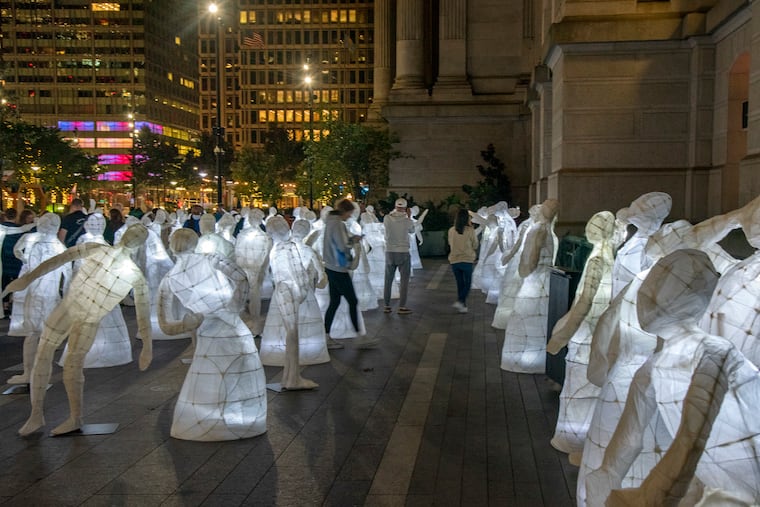Dilworth Park fills with life-size lanterns to raise awareness for suicide and mental illness
An Irish artist came to Philly to work with community members touched by mental illness and suicide. The result filled Dilworth Plaza with light.

This story contains references to suicide. If you or someone you know is thinking of suicide, call or text 988.
As the sun set over Philadelphia, dozens of white figures outside City Hall began to glow, a dot of light beaming inside the chest of every humanlike lantern. Each was crafted by hand from paper and wire to honor someone who died by suicide or is struggling with mental illness.
“Too often, we see people suffering in silence,” said Emily Norton Ashinhurst, executive director of the Irish Diaspora Center, which organized the one-night display.
But on Thursday evening, the 100-plus figures illuminated Dilworth Park and were surrounded by people committed to normalizing conversation about and treatment for mental illness.
» READ MORE: Talking about suicide on college campuses may help save a life
The one-night exhibit, called Lights in the Darkness, was the culmination of a monthlong community program to raise awareness about mental health organized by the Irish Diaspora Center of Philadelphia, a Havertown-based immigrant support organization. As part of the initiative, Philadelphia-area residents touched by mental illness or suicide were invited to work with Irish artist Tom Meskell to create a life-size sculpture.
Meskell specializes in creating art with communities and has done similar art installations in Ireland. With collaborator Tommy Casby, who is also an Irish artist, and volunteers from the Irish Diaspora Center he led five two-day workshops through September.
On the first day of each workshop, participants built body parts for the life-size lanterns, bending wire and taping together fixtures. Next, Meskell guided them in assembling the figures and encasing them in white paper.
Both the final product and the process honor people who have struggled with mental health, Meskell said. People in crisis often feel that there is no path for things to get better. Similarly, when Meskell’s community artists arrive at his workshops, they often have a hard time envisioning how the piles of wire and paper could become sculptures. But then they do.
“There’s a process to everything,” he said. “If you stick with this, you’re gonna get there.”
On Thursday evening, a few dozen people gathered to celebrate the exhibit in a ceremony that included an interfaith service offering prayer for people living with mental illness. Speakers talked about the importance of ending the lingering taboo about discussing mental health.
Ashinhurst, the event’s organizer, lost her husband to suicide in 2018. The pain still hits her in waves, she told the crowd, but she draws strength from having community, so she doesn’t have to go through the tragedy alone.
Mayor Jim Kenney reminded those gathered of 988, a new national mental health and suicide hotline. “It’s OK to not be OK, and it’s OK to ask for help,” he said.
About 175 people die of suicide every year in Philadelphia. The number of teens who have suicidal thoughts or who have made an attempt has been increasing in recent years, according to the city’s Department of Public Health.
» READ MORE: What to know about 988, a new national mental health hotline
Jordan Burnham, of Minding Your Mind, a nonprofit dedicated to ending stigma around mental health, shared in his keynote address that he attempted suicide at the age of 18. He was struggling with depression and said he needed to hear that he has a voice, he belongs, and that he is not alone.
He read a letter that he recently wrote to his younger self.
“Please just live for today because I promise tomorrow, and each day after, will get a little better,” he implored his 18-year-old self with the benefit of insight from the 15 years that passed since he attempted to end his life.
After the ceremony, the crowd walked around the lanterns.
The lit-up sculptures posed anonymously, without any information about who assembled them or in honor of whom. But each was unique and recognizable by its creators.
Among the white lights was a figure constructed by Ashinhurst’s 10-year-old daughter honoring her father.
The art installation gave Ashinhurst, her daughter and the dozens of others who joined them a way to process the pain of mental illness or the devastating loss of a loved one, she said, “and to be able to turn it into something beautiful.”
How to find help
- The 988 Suicide & Crisis Lifeline offers help in over 150 languages. Call or text 988. En Español, marca al 1-888-628-9454. If you're deaf or hard of hearing, call 1-800-799-4889.
- The Philadelphia Suicide and Crisis Center offers guidance and assessment about depression, self harm, hopelessness, anger, addiction, and relationship problems, at 215-686-4420.
- Veterans Crisis Chat is available at 1-800-273-8255 or by text at 838255.
- The Trevor Project offers crisis support to LGBTQ+ youth 25 and under. Call 1-866-488-7386, text START to 678678, or start a chat.